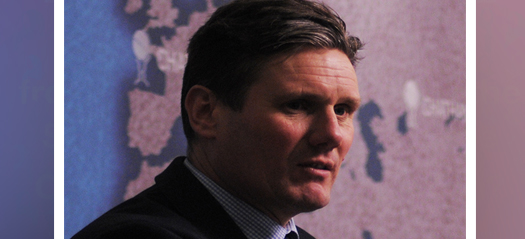
Sir Keir Starmer (Photo credit: Chatham House)
Hamed Chapman
Labour Leader, Keir Starmer, has broken ranks with Prime Minister, Boris Johnson, over his controversial decision to lift almost all remaining Covid-19 restrictions for England from July 19, describing his plans as irresponsible.
“The idea that, as the infection rate goes up, you throw off all protections at the same time I’m afraid is reckless,” Starmer said after Johnson confirmed he was scrapping mandatory mask-wearing and removing social distancing requirements despite warnings by Government scientists.
Labour would keep mask-wearing compulsory on public transport, at least until cases are past their peak, he said. Daily Covid cases are expected to reach over 100,000 within the next two weeks as the numbers continue to soar.
Documents released by the Scientific Advisory Group for Emergencies (Sage) warn that ongoing measures will be needed to control a resurgence in infections that have already reached their highest daily total since January.
The Academy of Medical Royal Colleges, which represents 23 medical bodies responsible for training and development in various specialities, also said in a statement the situation with Covid will get worse before it gets better and that it was essential people took a responsible approach when restrictions were formally lifted.
Hospitals were starting to announce that non-urgent surgery is being postponed because of rising admissions of Covid patients, very high patient numbers at A&E and staff absences caused by self-isolation requirements.
A BBC analysis showed that by mid-August more than 4.5 million people could still be asked to self-isolate as Starmer accused the Prime Minister of “ignoring the next big problem that’s heading down the track.”
At a Downing Street briefing on July 5, Johnson did admit that the delayed final phase of his opening up would also be followed by more hospitalisations and more deaths but argued that doing it in the summer “has an advantage in the colder months, or again putting everything off to next year.”
“As we come to the fourth step, we have to balance the risks. The risks of the disease which the vaccines have reduced but very far from eliminated. And the risks of continuing with legally enforced restrictions that inevitably take their toll on people’s lives and livelihoods – on people’s health and mental health,” the Prime Minister argued.
But opposition to his plans also came from mayors from some of England’s biggest cities, including the Mayor of Greater Manchester, Andy Burnham, who warned that dropping the requirement to wear masks on public transport “would be a recipe for conflict and confusion.”
Dan Norris, the Labour Mayor for the West of England, said he also wanted to keep mask-wearing mandatory until the number of Covid-19 infections starts falling, saying “many people are still anxious about travelling by public transport.”
“The wearing of face coverings on public transport helps reduce the spread of Covid, crucially, it gives Londoners confidence to travel – which is vital to our economic recovery,” warned the Mayor of London, Sadiq Khan.
A poll carried out by YouGov also found overwhelming public support with 71 per cent supporting that “face masks should continue to be mandatory on public transport for a further period of time” and only 21 per cent were opposed to keeping them.
Green Party MP Caroline Lucas went further in a tweet, accusing the Tory Government of “washing their hands of any responsibility” by abandoning all measures to control the pandemic.
The Unite Union, which represents workers in the transport industry, particularly bus drivers, said that ending the requirement to wear face coverings on public transport would be “an act of gross negligence”.
At the Prime Minister’s Downing Street briefing, the Chief Medical Officer, Professor Chris Whitty, admitted he would wear a mask in many circumstances, especially given “the epidemic is significant and rising” at the moment.
The chief Scientific Adviser, Sir Patrick Vallance, echoed his colleague adding masks are particularly crucial indoors in “crowded spaces.”
When asked where and when he would continue to wear a mask, Johnson said, “It will depend on the circumstances”.
“Clearly there’s a big difference between travelling on a crowded Tube train and sitting late at night in a virtually empty carriage on the main railway line,” Johnson replied.
“We want people to exercise their personal responsibility but remember the value of face coverings both in protecting themselves and others,” he said.